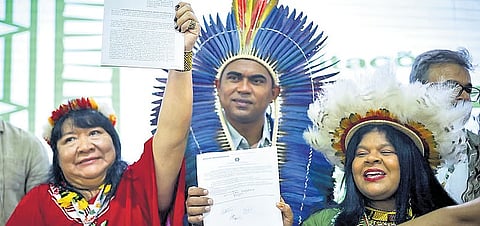

BELEM(BRAZIL): The UN climate summit in Brazil is in its second and final week. Negotiators have till November 21 to untangle the knots they have not been able to resolve in the 29 meetings since Berlin 1995.
Delegates must navigate four major sticking points — climate finance, weak national climate plans, trade, and transparency.
Officials have moved these issues into separate closed-door consultations. That alone signals how hard it is to find consensus.
The world is warming faster than expected this year. Scientists say 2025 is on track to become one of the hottest years ever recorded.
Yet delegates in Belém spent most of their time restating old positions.
The biggest fight is over money. The Baku-to-Belém Roadmap aims to raise $1.3 trillion annually by 2035 for poor countries struggling with the impacts of climate change.
The plan calls for reforming development banks and attracting private investors.
But delegates could not decide how much would come from government budgets versus private companies.
The World Resources Institute said the roadmap was the most serious attempt yet to match global finance with real needs.
But analysts warned private money rarely went to the hardest problems. Cities need help coping with frequent floods.
Farmers need seeds that survive droughts. Communities need support after storms destroy their homes. None of these attracts corporate investment.
Wealthy nations want everyone to cut emissions faster. Poorer nations say they need cash first.
Neither side moved during the first week. The trade dispute cuts even deeper. Some countries want to use tariffs to pressure others into cutting pollution.
Others see this as economic warfare dressed up as climate policy. These fights threaten to derail the entire summit.
Delegates also clashed over transparency. Rich nations want strict rules to verify that everyone keeps their promises. Developing nations worry these rules will become another burden without any new support.
Then there is the problem of national climate plans. Scientific reports make clear what is at stake.
The State of Climate Action 2025 found that every part of the global economy was changing too slowly.
Other research showed that current promises would still lead to dangerous warming. But no one agreed on how to push countries to do more.
Advocacy groups outside the official talks say they are struggling to be heard. Several pointed out that hundreds of oil and gas lobbyists have registered for the summit, thereby damaging the its credibility. Indigenous leaders said they have no access to spaces where diplomats decide the fate of their lands.
A few hopeful signs emerged during the first week. Finance ministers from several countries started exploring ways to fund the roadmap. Development banks said they wanted to coordinate better. Some nations floated ideas about more reliable long-term funding.
But those were just conversations. No one has agreed on how to collect $1.3 trillion every year.
No system exists to help countries recover from disasters. No mechanism has emerged to force stronger climate plans.
Fund crisis, confusion led to clashes in the summit
The Baku-to-Belém Roadmap aims to raise $1.3 trillion annually by 2035 for poor countries struggling with the impacts of climate change. The plan calls for reforming development banks and attracting private investors. But delegates could not decide how much would come from government budgets versus private companies.
The story is reported by Soumya Sarkar for The New Indian Express
